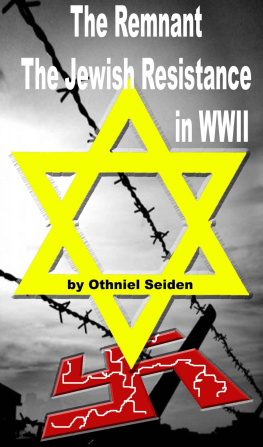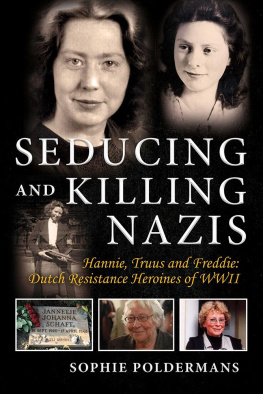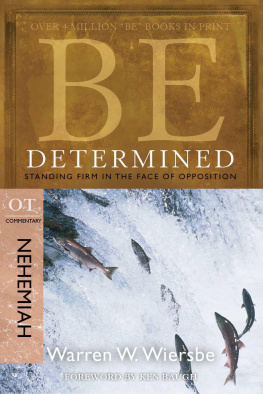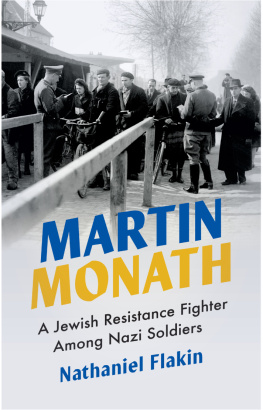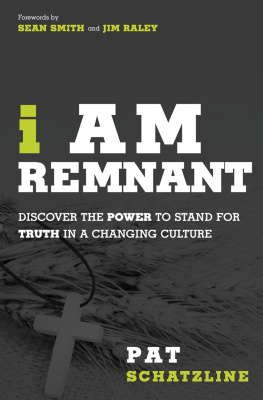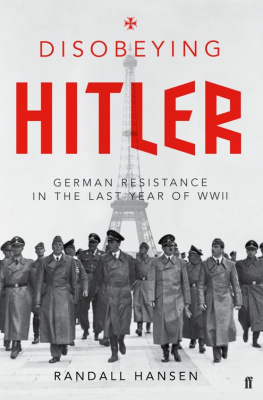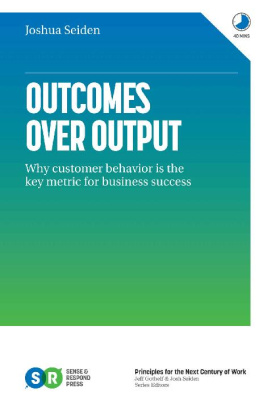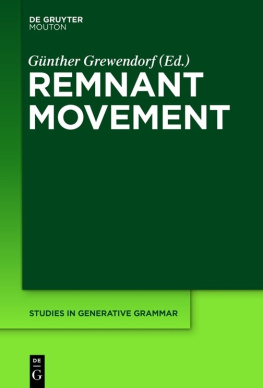Othniel J. Seiden - The Remnant - The Jewish Resistance in WWII
Here you can read online Othniel J. Seiden - The Remnant - The Jewish Resistance in WWII full text of the book (entire story) in english for free. Download pdf and epub, get meaning, cover and reviews about this ebook. year: 2008, publisher: Books To Believe In, genre: Detective and thriller. Description of the work, (preface) as well as reviews are available. Best literature library LitArk.com created for fans of good reading and offers a wide selection of genres:
Romance novel
Science fiction
Adventure
Detective
Science
History
Home and family
Prose
Art
Politics
Computer
Non-fiction
Religion
Business
Children
Humor
Choose a favorite category and find really read worthwhile books. Enjoy immersion in the world of imagination, feel the emotions of the characters or learn something new for yourself, make an fascinating discovery.
- Book:The Remnant - The Jewish Resistance in WWII
- Author:
- Publisher:Books To Believe In
- Genre:
- Year:2008
- Rating:4 / 5
- Favourites:Add to favourites
- Your mark:
- 80
- 1
- 2
- 3
- 4
- 5
The Remnant - The Jewish Resistance in WWII: summary, description and annotation
We offer to read an annotation, description, summary or preface (depends on what the author of the book "The Remnant - The Jewish Resistance in WWII" wrote himself). If you haven't found the necessary information about the book — write in the comments, we will try to find it.
The Remnant - The Jewish Resistance in WWII — read online for free the complete book (whole text) full work
Below is the text of the book, divided by pages. System saving the place of the last page read, allows you to conveniently read the book "The Remnant - The Jewish Resistance in WWII" online for free, without having to search again every time where you left off. Put a bookmark, and you can go to the page where you finished reading at any time.
Font size:
Interval:
Bookmark:

about the
Jewish Resistance
in WWII
by
Baby Boomer Series Publication
To Jessica,
the DINH... the DINH
This story I begin to put to paper now is an account of the Holocaust that has been largely ignored these past decades.
Of all the tales of this inhuman time, little has been written or spoken of the Jewish resistance against the Nazi forces. Much has been documented about the slaughter of our men, women and children, but too little is known of the heroic efforts against horrific odds by those few of us who were able to stay free enough to fight.
This is not really my story; it is the story of "The Remnant." Every Jew alive after the Holocaust is a survivor and one of The Remnant. Anyone having the least amount of Jewish blood in his or her veins is a survivor and as part of the Remnant is alive today not by any skill or intelligence of his or her own but because of luck. Actually, alive by more than luck, alive because of the will of God, for it is God who promised The Remnant. Jews of any nationality outside of Europe are alive today only because of the foresight or wanderlust of one of their ancestors. Had they stayed in Europe until the Holocaust, chances are these jews would be ashes today as are six million of our co-religionists.
This is our story and I must tell what I know of it before my earthly time is past. There are too few of us left to give testimony-to chronicle this horrific past. Tragically, there are those today who would rather avouch that this tragic time was myth and fantasy. These libelers must be exposed for the liars they are, their slanders refuted. As the Nazis slaughtered six million of us, these slanderers are trying now to destroy the memory of our martyrs. They too are Hitlers and must be confronted with the truth.
The anti-Semites love to say, "They went to their deaths like sheep to the slaughter!" I hope the story which follows dispels this insufferable myth. Those who died, died because they had no chance to fight back, had no place to escape to-but, those few who were able to escape fought and fought bravely, against horrific odds. Those few Jews who remained "free,"-less than 3% of the total population of Jews in Europe-made up a large percentage of the total resistance against the Nazis, perhaps as high as 20% of that battle.
They not only had to hide themselves from the Nazi forces, but also from the general population of most of the occupied countries, for that population would gladly have turned Jews over to the enemy or killed them outright from their own anti-Semitic hate.
Sadly, the lessons of that horrible time were poorly learned. Every decade in this intervening time has had its own holocaust. Indo-China, Cambodia, the Sudan, Rwanda, Bosnia, in Central and South America- millions of people have suffered inhuman atrocities-anguished deaths-because of ethnicity, race, religion or for being in the way of some maniacal ambition or agenda. Forgetfulness is no cure for man's inhumanity. These stories must be told and retold as often as possible to save the future races.
The story I tell I know from those who lived those terrible years in the forests with me. I know them from diaries left behind by those who didn't live to give confirmation on their own. In those long and lonely hours, days, years in the forests, we shared our most intimate thoughts, feelings and certainly our fears. And then there were the transcribed testimonies at Nuremberg-all to supplement what my comrades and I experienced in the forests.
Thus, in my 80th year I shall finally detail my account and what I know of the stories of so many others. I begin penning this story in the fall of 1998, 59 years after it began for me.
On September 1, 1939, I turned 21. I was born in 1918, as World War I drew to close. I was presented with the beginning of World War II for my twenty-first birthday. It was the day Hitler's forces invaded Poland to begin that conflagration.
My name is Dov, short for Dovid or David as you say in America. Dov Malmed was how I was known in those days. As a child I was called Dovy, but after I was about sixteen only my grandmother, of blessed memory-Olov Hashalom-may she rest in peace-continued to refer to me as Dovy. Dov is how I will refer to myself in this account.
As far back as anyone could remember, our family has always been Polish. For all I knew, my ancestors came to Poland in the year 1492 when Spain expelled all her Jews. Poland invited her refugees to settle there.
On my twenty-first birthday, the long history of the Jews in Poland was launched toward its conclusion. I recall my first image of the beginning of this holocaust. My attention was drawn to it by a strange thundering to the west. Our village was some seventy kilometers to the east and south of Warsaw. It was early in the morning and as the light strengthened we saw smoke rising high in the direction of the great city. It climbed steadily from the horizon, higher and higher into the morning sky, until it darkened the white clouds. The smoke would not cease for most of a month, as the thunder of bombs and cannons spread over the country. By October, the government had capitulated and all of Poland was in the hands of her German oppressors.
Most of Poland's Jews were trapped awaiting a fate too fantastic to anticipate or imagine. Less than two percent of us remained "free" in hiding, able to even consider saving ourselves or fighting back. It was the same all over Europe. Few of us were able to stay out of captivity. Those who were engulfed couldn't resist and had nowhere to escape to. We had little chance of survival.
My account is of those unfortunate and fortunate whose paths I crossed.
Solomon awoke in a small enclosure-the space under a stairway-dimly lit by a lantern. His eyes were not yet open and he sensed strangeness. It was that first moment when one awakens. Somehow he knew he was in an unfamiliar place. Horizontal boards slowly came into focus, as he opened his eyes, dimly lit boards about twenty centimeters wide, making up a wall not more than two hands from his face.
Unfamiliar. This cot-unfamiliar! The ceiling slopes down toward my head-the underside of stairs. "Oh! It hurts to move!" I'm sore-stiff. This wall on the other side of me is stone-cold stone. "Where the hell am I? How did I get here?" His voice was weak as a whisper, his throat felt dry. Am I a prisoner? I can't remember. I can't remember anything!
These sheets-clean sheets. I'm naked! Where am I? There's barely room in here for this cot. It's some kind of a cell. A prison cell? I don't see a door. No window? My God where am I? Only this cot and that lantern hanging under that top step-there's nothing else in here. Is that an entrance? It's almost too small. What's that? Sounds like a door opening-footsteps...
As the sound advanced down the stairs, terror filled Solomon. They were heavy steps on the stairs that made the lantern swing and caused eerie shadows to move on the walls. He could follow the steps along the other side of the board wall. They're coming for me! He heard wood sliding. A man came through the small opening at the foot of the tiny cot. A big man, he hardly fit through the small opening.
Strangely Solomon's first thought was, he doesn't wear a uniform; he felt a slight relief. He wondered, why did I expect a uniform? Why did I fear a uniform? The man straightened at the foot of his cot. Huge! He was huge. Massive! Powerful! He smiled.
Font size:
Interval:
Bookmark:
Similar books «The Remnant - The Jewish Resistance in WWII»
Look at similar books to The Remnant - The Jewish Resistance in WWII. We have selected literature similar in name and meaning in the hope of providing readers with more options to find new, interesting, not yet read works.
Discussion, reviews of the book The Remnant - The Jewish Resistance in WWII and just readers' own opinions. Leave your comments, write what you think about the work, its meaning or the main characters. Specify what exactly you liked and what you didn't like, and why you think so.

